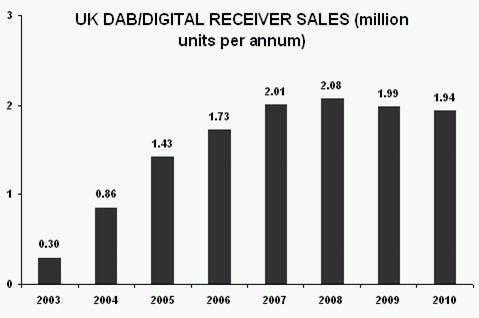DAB radio's declining sales: eForum revisited

One of the slides I used in a talk at this week's Westminster eForum on The Future of UK Digital Radio prompted a hostile response from someone in the audience. This wasn't a surprise -- I expected more hostility than I got -- but highlighted something that might have passed unnoticed: sales of DAB radios are in decline. However you spin it, this doesn't look good for the future of Digital Audio Broadcasting in the UK.
The argument from the floor came from Anthony Sethill, founder and chief executive of Frontier Silicon, and he made some rather amusing remarks. According to Grant Goddard's Radio blog, he said:
"So, I think the panel today, with the exception of Andrew [Harrison, RadioCentre chief executive] is a wonderful example of how the minority seem to take the stage and voice the negativity and things."
Frontier Silicon sells DAB radio chips to manufacturers, and RadioCentre exists to promote commercial radio, so both Sethill and Harrison have a vested interest. As a radio listener and independent journalist, I'm obviously not speaking for the trade, but I'm certainly not speaking for a minority. It's a fact that most consumers have not bought DAB sets, and most consumers do not listen to DAB radio. On RAJAR's numbers for radio listening hours by platform, old-fashioned analogue radio still has about 67% of the market, while DAB has about 16%.
The key question is: Why is the government listening to a DAB lobby that has a vested interesting in flogging us stuff? Why isn't the government listening to the substantial majority of the radio audience? Try asking your MP that one.
 Annual UK DAB sales. Source: Grant Goddard
Annual UK DAB sales. Source: Grant Goddard
However, Sethill's main complaint was that I had used a slide that showed the decline of DAB radio sales in the UK (above), which he reckoned wasn't accurate. Again, quoting from Grant Goddard's Radio blog, he said:
"This is a practical example of discrediting the data, which a number of people use to bash DAB. So this is one small example of how you’re misinterpreting and you’re misleading people. I don’t know if you understand what GfK is, or what it has done, or why it has fallen apart but, if you do, then that’s really poor. And if you don’t, before you quote it, you should learn the facts."
But as noted above, I sourced this particular slide from Grant Goddard, who may well be the most expert person in the UK when it comes to the radio market. Goddard says: "The sales data in my graph were distributed by Digital Radio UK, the radio industry organisation marketing DAB radio in the UK."
As Goddard somewhat wryly observed in his blog post: "It seemed wholly inappropriate for Anthony Sethill to beat up panellist Jack Schofield in public for using the digital radio industry’s OWN DATA in his presentation."
Sadly, this is exactly what I expect from the DAB industry. If you have the temerity to differ, you must expect personal attacks. I take this as sign that DAB's proponents know they are losing the argument.
Of course, I would have been perfectly happy to use a graph that showed DAB radio sales increasing, because we all know that DAB has not taken off. The fact that Sethill thinks it's worth arguing about sales of 50,000 or so radios simply shows that he has missed the point. Really successful digital products have a rapid adoption profile unlike the one in the graph. Examples include the Sony PlayStation and PS2, the Nintendo Wii and DS, Apple's iPod, iPhone and iPad, Android phones, LCD TV sets and probably even Freeview boxes.
As I said in my talk, it's instructive to compare DAB with the World Wide Web. Both were developed in the early 1990s. Both started to reach a wider public in 1995, the year DAB was launched. Since then, the web has changed the world, while DAB hasn't even changed the way Europeans listen to the radio. In the UK, DAB has taken 16 years to pick up its 16% listenership, and that's with both government support and free advertising on the BBC.
As far as I can see, DAB is mainly a replacement market. Many or perhaps even most of the people who need a new radio may well be buying a dual DAB/FM model, but do they actually want DAB?
I suspect that the government's widely reported plans to, in effect, switch off FM mean that people are buying DAB/FM radios mainly because they see them as the safer choice, not because they are DAB enthusiasts. If consumers are being bullied, it's not by me, it's by a supine government and a profit-seeking radio industry.